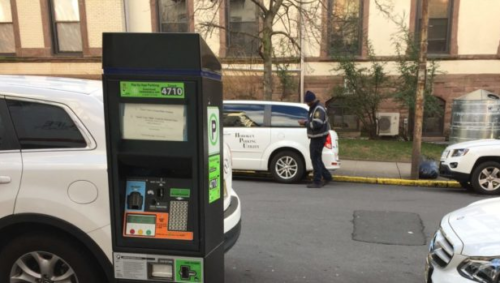
Hoboken Parking Conundrum About to Become More ‘Dynamic’
Hoboken’s City Council recently approved measures that will impact the way people park in the Mile Square City. While most Hobokenites can all agree that parking needs to be improved, the big questions are how, exactly.
Finding a decent on-street parking spot in Hoboken these days can be like finding a Sasquatch riding a Unicorn. Meanwhile, Hoboken has parking garages—but they’re reportedly underutilized, particularly by visitors.
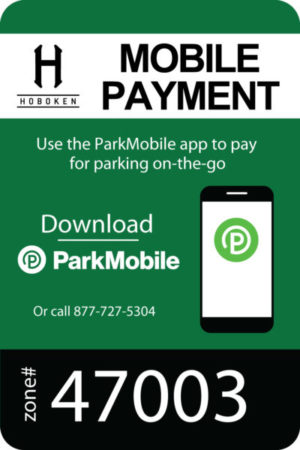 “Hoboken also has a pricing equilibrium problem between its on-street parking and its garages,” says Ryan Sharp, Hoboken’s Director of Transportation and Parking. “Premium curbside parking on Washington Street is just $1.00/hr right now, while the first hour in Garage B two blocks away costs $7/hr. This lack of pricing equilibrium between on-street and garage parking rates creates many problems, including a persistent lack of on-street parking availability, increased congestion, pollution, high volumes of parking violations, and increased pedestrian-motor vehicle conflicts as drivers cruise for parking.”
“Hoboken also has a pricing equilibrium problem between its on-street parking and its garages,” says Ryan Sharp, Hoboken’s Director of Transportation and Parking. “Premium curbside parking on Washington Street is just $1.00/hr right now, while the first hour in Garage B two blocks away costs $7/hr. This lack of pricing equilibrium between on-street and garage parking rates creates many problems, including a persistent lack of on-street parking availability, increased congestion, pollution, high volumes of parking violations, and increased pedestrian-motor vehicle conflicts as drivers cruise for parking.”
Hoboken’s answer: Dynamic Pricing
“Dynamic on-street pricing aims to achieve parking policy best practice of 85% occupancy rates on street, which means 1-2 parking spaces should be consistently available on each block within business districts. To accomplish that, on-street parking rates will increase to between $0.50 and $0.90 for 15 minutes, which are similar to rates in New York, Philadelphia, Washington D.C., Boston, Miami, Seattle, and San Francisco.”
Dynamic pricing is also referred to as surge pricing or demand pricing, in which prices are flexible based on current market demands. Like airline tickets, Uber/Lyft, or things you buy on Amazon, prices fluctuate based on algorithms that take into account supply and demand, as well as other external factors in the market.
“Dynamic pricing basically means that on-street metered parking rates vary based on either location, time of day, or day of the week,” says Sharp. “Dynamic pricing is emerging as a best practice in transportation and parking policy and is used by many cities around the world. It makes sense if you think about it—on-street parking demand is greater in central business districts or along commercial corridors such as Washington Street or Hudson Place than other parts of the city, so the price of curbside space in these areas shouldn’t be equal to streets with lower parking demand.”
Many have made the argument that Hoboken’s on-street parking has been too inexpensive, which had lead to widespread over-dependence.

“Parking rates of just $0.25/15 minutes ($1/hr.) have been around for well over a decade, all the while parking occupancy rates on-street in business districts have consistently been at or above 100% between 9am-9pm,” says Sharp. “This means that on-street parking isn’t priced right to generate turnover, and thus the City is essentially subsidizing its own parking problem with rates that are far below other cities across the country with comparable parking demand and space constraints.”
As for the garages, “hourly garage parking rates will decrease in Garage B, Garage D, and Midtown Garage for the first hour to encourage more short-term visitors arriving by car to park in garages,” says Sharp. “Monthly parking rates will also increase for the first time in over 10 years to fund critical maintenance and repairs to the City’s parking garages.”
Hoboken’s parking issues have become fairly notorious over the years. An infamous FOX 5 segment highlighted some overzealous enforcement, while hMAG has at times referred to Hoboken Parking as, “an arbitrary, life-sucking spider web.” The omnipresent challenge of legally parking in Hoboken is universally frustrating, to anyone who has tried to spend any amount of time here.
“For most visitors it is the first experience of being in our city,” says Andrew Impastato, of Hoboken Parking Dude. “For most visitors it is the reason they don’t come back. For most residents it is a daily frustration and added cost yearly for living here, one that drives many to live in other cities.”
Impastato’s Hoboken Parking Dude is a mobile app and service that endeavors to educate and inform residents and visitors alike on the intricacies of parking in the City. Like many, he has his reservations about the dynamic pricing plan.
“If implemented without any electronic signs at our entrance points to inform visitors of the price differences between parking in a garage or on a street in real time at specific times and days; no one will understand the difference and they will find a spot, pay the higher fee, get frustrated and not visit again,” says Impastato. “We need to make it easy for our visitors to park not just take advantage of them.”
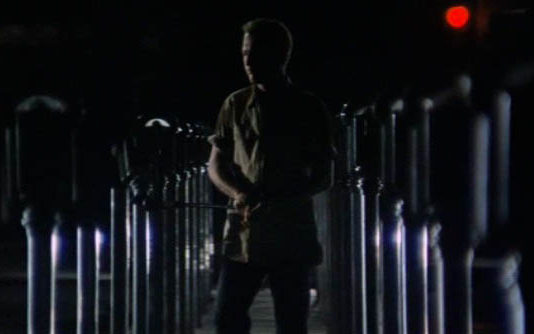
ABOVE: Cool Hand Luke prepares to cut the heads off parking meters
According to Sharp, “The City’s goal over the next 5 years is to use some additional parking revenue generated through the new price changes to invest in cutting edge parking technology that can vary parking pricing in real-time depending on supply and demand. That technology would also be incorporated into an app which shows real-time parking availability across Hoboken.”
Impastato sees other opportunities for improvement. “We should look to incentivize residents to park in garages by rewarding them with yearly Path cards or NJ Transit bus passes. We need to open the parking data and make it available to any mobile app that wants to use technology to help notify, inform, and alert those parking of all our rules and regulations. A perfect example of this, are the on going disasters of the current Temporary No-Parking sign program. The signs are posted without warning, ripped down or ruined in storms, and the result are cars being towed unjustly on a weekly basis. If apps like ours had the data available and open sourced from the City, we can deliver the information in real time via text messages and help those get notified well in advance to avoid all tickets and towing. We also need to create free visitor parking zones for those who can show a receipt for spending money at our local shops and restaurants. We can use empty lots like ACME, Shoprite, midtown CVS, and other city owned surface lots to park visitors’ cars and offer a valet service to and from their place of visit.”
According to Impastato, who recently ran for Hoboken City Council, the City is dealing with a significant image problem when it comes to parking.
“We have to change the branding of our parking problem and of our Hoboken Parking Utility (HPU) to create a more positive mindset for better user experiences for our residents and visitors. Start with the dark, uninviting HPU jackets the ticket enforcers wear walking around the city. Why not change them to a more positive color like yellow or green and put in bold lettering on the back of the jacket, ‘Stop me and ask me about parking, I am here to help.’ And we should be spending money on training this department in customer service so they can politely answer all questions and be accurate and educated with their responses.” says Impastato.
“City parking should have many options, should be communicated easily, and enforced passively. Solutions exist and need to be implemented before more shops close, more buildings vacated, hundreds of residents move away, our real estate collapses, and the city turns to a bunch of ghosts floating around staring at unused bikes and electric scooters.”
Hoboken’s new parking policies will go into effect on any street that has metered on-street parking, starting in January 2019.
***

 Previous Article
Previous Article Next Article
Next Article FEATURED PROPERTY: 744 Park Ave #4R, Hoboken | 2BR/2BA Condo – $599,000
FEATURED PROPERTY: 744 Park Ave #4R, Hoboken | 2BR/2BA Condo – $599,000  FEATURED PROPERTY: 501 Adams Street 4K; Stunning 2BR/2BA Condo in Converted Schoolhouse — $685,000
FEATURED PROPERTY: 501 Adams Street 4K; Stunning 2BR/2BA Condo in Converted Schoolhouse — $685,000  MARIA PEPE SERIES: Baseball For All Tournament Comes to Hoboken – June 29th & 30th
MARIA PEPE SERIES: Baseball For All Tournament Comes to Hoboken – June 29th & 30th 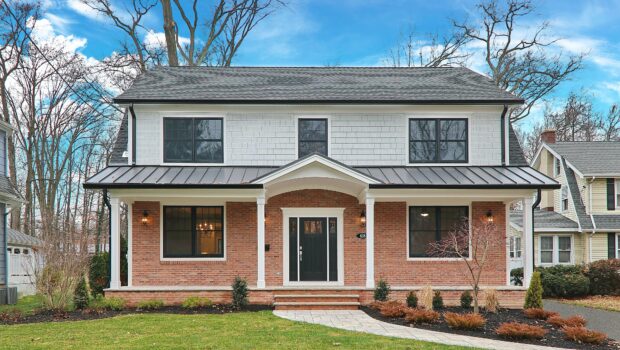 FEATURED PROPERTY: 618 Dorian Road, Westfield | 5BR/6BA Colonial | $1,379,000
FEATURED PROPERTY: 618 Dorian Road, Westfield | 5BR/6BA Colonial | $1,379,000  FEATURED PROPERTY: 100 Manhattan Avenue #1119, Union City | 1BR/1BA | $249,000
FEATURED PROPERTY: 100 Manhattan Avenue #1119, Union City | 1BR/1BA | $249,000  PÓG MO HOBOKEN: Annual LepreCon Pub Crawl Returns
PÓG MO HOBOKEN: Annual LepreCon Pub Crawl Returns 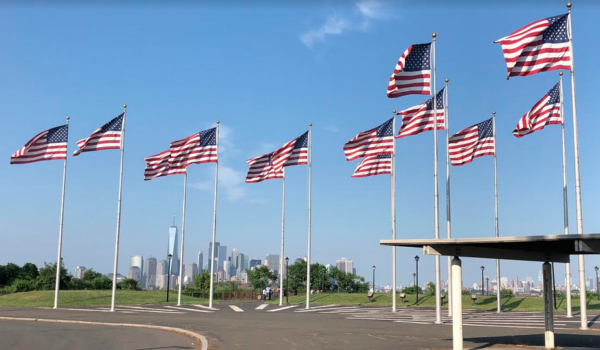 hOMES: Weekly Insight Into Hoboken & Jersey City Real Estate Trends | July 12, 2019
hOMES: Weekly Insight Into Hoboken & Jersey City Real Estate Trends | July 12, 2019  FEATURED PROPERTY: 119 Madison Street #2E, Hoboken | 2BR/2BA Condo | $799,000
FEATURED PROPERTY: 119 Madison Street #2E, Hoboken | 2BR/2BA Condo | $799,000